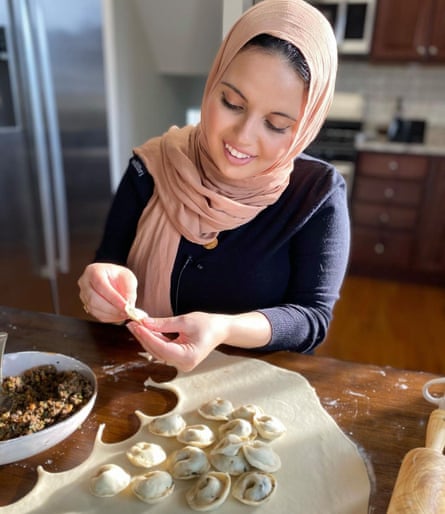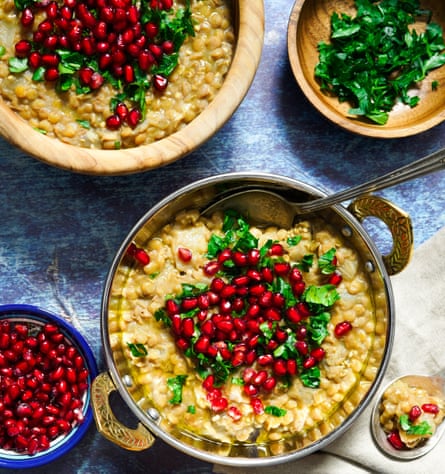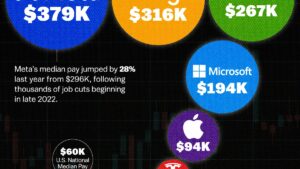Wwhen Heifa Odeh first moved to Chicago, she was homesick for her mother’s Palestinian cooking and a desire to master the dishes she grew up with – so she began writing down her mother’s recipes and sharing them online. Whether she was whipping up stuffed grape leaves or hand-forming shish barak (meatballs cooked in yogurt), she simply wanted to evoke the taste of her mother’s kitchen and the frequent summer trips her family would take to Palestine.
But as the years passed, she built a successful food blog called Fufu’s kitchen and later published a cookbook called Eat in Palestine, she began to see the sharing of Palestinian recipes as something more: an assertion of identity and connection to a land and people under threat. This has never felt more important to her than in the past two months, as more than 20,000 Palestinians have been killed by Israeli forces in Gaza so far, following a Hamas attack that killed 1,200 Israelis.
“I started my blog as a way to preserve my Palestinian identity,” Odeh shared in an Instagram post on October 30. “I know I’m ‘just’ a Palestinian Food Blogger, but I choose to share the food of my people as a form of resistance.”
As much as she loves just sharing recipes for pistachio cardamom ghraybeh shortbread cookies, not speaking out about the violence and displacement Palestinians face didn’t feel like an option for her. Not least because as a result of the blockade and bombing Palestinians increasingly without access to the water and food – a stark contrast to Odeh’s own kitchen, and one that pains her to think about. “I wouldn’t say I’m a political person, but you have to stand up for what’s right,” she said later on the phone.
She’s not alone: Odeh is just one of a number of chefs and food influencers using cooking as a medium through which to tell more humanizing stories about Palestinians.

Wafa Shami, who grew up in Ramallah, a Palestinian city in the West Bank, and moved to California as an adult, is another. The food photographer and recipe developer behind Palestine in a dish, Shami noted that simply saying she is from Palestine is seen as a political statement, whether she intends to or not. While recognizing the value of activism and lobbying, she chose to engage instead through images of musakhan roles (chicken and caramelized onion rolls) and rummaniyeh (lentil and eggplant stew).
“I just want to show the beauty of Palestine, the humanity, the culture, away from the politics,” she said. “Images in the mainstream media here basically show Palestinians as evil, angry, throwing stones or burning tires. But Palestinians are so much more – our art, our music, our food.”
Stacks become luxuries
Perhaps no one has more clearly articulated the connection between Palestinian cuisine and political realities Laila El-Haddadjournalist and co-author of the 2013 cookbook The Gaza Kitchen. El-Haddad grew up between Kuwait and Saudi Arabia and spent summers in Gaza before moving to the US to attend Duke and Harvard. She returned to Gaza as a reporter for Al Jazeera before moving to Maryland, where she now lives.
“The more I wrote about guns and hard news, the more tired I got. If my goal was to convey the everyday struggle of Palestinians to a wider audience, especially a Western audience, I felt like I was failing,” she said. “So I felt like maybe [writing about food] is something that can be more effective in telling the story in a different way.”
Take, for example, the remarkable diversity of Gaza’s cuisine despite its small size. Gaza City food is known for its spiciness and use of peppers, while villages in the farming interior of the Gaza Strip eat much milder food. Those differences, El-Haddad said, stem from the population of Gaza, which consists of Palestinians from all over the country who ended up in Gaza after the 1948 nakba and have never been able to return to their villages. They all brought their local cuisine with them, turning Gaza into a center of culinary diversity.
Shrimp stews baked in traditional clay pots were a Palestinian favorite in the past. But in recent years, seafood has increasingly become a luxury in Gaza, despite being a coastal area. It is difficult for citizens to get their hands on seafood because Israel ban Palestinian fishermen from venturing more than 15 nautical miles from the coast, limiting their catches and because the “deliberate impoverishment” of the population has made fish and other animal proteins increasingly unaffordable, El-Haddad said. The World Food Program stated that “100% [of the population of Gaza] are currently food insecure” compared to 33% before October 7, a predicament that has was “worsened by intensified blockades” and the bombing of at least a fifth of the bakeries in Gaza.
If any ingredient symbolizes Palestine, it is olive oil. Shami has fond memories of harvesting olives as a child and even wrote a children’s book about the experience. “The harvest is a festive occasion for Palestinians – they sing and dance and celebrate the blessing of the trees every year,” she said. “If you drive through different towns and villages in Palestine, you will see a ton of olive groves that can live for more than a thousand years.”

But this symbol According to El-Haddad, the Palestinian connection with the country has been slowly chipped away. Israeli forces have targeted agricultural infrastructure, from land itself to irrigation systems to farmers’ homes. Farmers were harassed or prevented from tending their land and harvesting from their olive groves, to let olives rot on the trees. In one recent case, IDF soldiers detained an olive farmer in the West Bank, who was talking to reporters, preventing him from reaching his land; in another was an olive farmer harvesting with his family murdered by an off-duty IDF soldier.
The resulting drop in production hurts on a dietary and symbolic level for a people who rely heavily on olive oil in their cuisine and identify deeply with olive trees. Even before the current bombardment, El-Haddad said, olive oil had begun to shift from a staple to a luxury item in Gaza.
Sometimes the pain hits particularly close to home: the Gaza Kitchen, now in its third edition, has outlived some of its contributors. El-Haddad’s aunt Anaam Daloul, whose recipe for pickled eggplant appears in the cookbook, was killed in an Israeli airstrike three weeks ago.
The joy of eating
Just as Palestinians are targets of violence, so are Palestinian foodways. Yet food remains a source of joy and passion for many Palestinians in Gaza, the West Bank and the wider diaspora.
Motaz Azaiza, a young Palestinian freelance journalist who has emerged as one of the leading documentarians of the war on the ground in Gaza, has posted some of the sharpest and most haunting images of the aftermath of the bombings. He also recently had a video on Instagram of friends cheering as one man flips makloubeh, a dish in which vegetables and sometimes meat are cooked in a pot of seasoned rice, with a caption that says “our Maklouba is our resilience”. The video, which has been viewed 62.7 million times, is just one small example of the ways in which food can spark joy even in the darkest of circumstances.

El-Haddad recently saw another example of the bonding power of food in a large group chat for Palestinian Americans from Gaza. On one occasion when the group got a little too “rubbery” in a political debate, she simply asked, “What’s everyone cooking for dinner?” to de-escalate the conversation. Contestants spent the next hour excitedly sharing their favorite foods from home, she noted with a chuckle.
For Shami, sharing beautiful food images from her kitchen in California felt wrong at a time when she knows so many in Gaza are “with the immediate possibility of starvation“. But she is “overwhelmed in a positive way” by how many people from all over the world are writing to her, tagging her in pictures and letting her know that they are currently cooking her dishes. Odeh also described being “moved to happy tears” by people – many of whom are neither Palestinian nor Arab – letting her know that they were using her recipes to cook Palestinian food for the first time ever. That solidarity through food meant the world to both women.
“When you share a meal with someone, you’re connected on a deeper level,” Shami said. “We have a saying at home that goes something like: ‘I am connected to that person because we broke bread together.’ food connect people. That’s how we tell these stories.”
A Deep Dive into Free Coins Generation in LivU Video Chat
Coin Master Free Spins Today: Quick Tips
Avakin Life Avacoins Farming: Your Ultimate Guide
How to Get Credits in Bingo Blitz Effortlessly
Coin Master Spin Hack for Gaming Enthusiasts
genshin impact free primogems code updated gamerpower
ZEPETO Zems Farming Techniques: Unveiled
match masters free boosters daily new free links
TikTok Coin Farming: What You Need to Know
Free Gems in Brawl Stars: The Ultimate Game Changer
cheat dragon city free gems apk happymod
family island join the game for 300 free rubies facebook
free hay day diamonds get unlimited diamonds generator 2022
litmatch mod apk 3 9 0 0 unlimited diamond free cheat games
TikTok Coin Hacks: What Experts Recommend
TikTok Coin Hacks: Boost Your Account for Free
TikTok Coin Farming: What You Need to Know
TikTok Coin Generator Scams: Avoiding Pitfalls
Trucos de Monedas TikTok: ¿Realmente Funcionan?
Free TikTok Coins: Insider Secrets
Élevez votre expérience TikTok avec des pièces gratuites
LivU Video Chat Free Coins Hack Safety: Best Practices
Insights from Pros: Coin Master Free Spins Farming Strategies
Free Avacoins in Avakin Life: Where to Find Them
Free Credits in Bingo Blitz: The Future of Bingo Gaming




